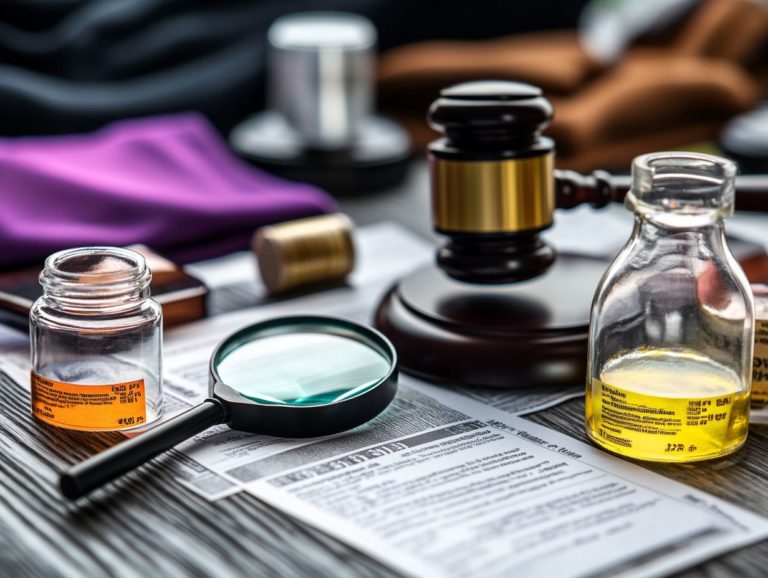5 Things You Didn’t Know About Trademarks
Trademarks serve a vital purpose in shaping and safeguarding your brand s identity, yet misconceptions about them persist.
They encompass much more than merely logos and slogans. Trademarks can be registered internationally, licensed, and even endure indefinitely.
This article delves into five surprising facets of trademarks that could profoundly influence your business. By grasping the nuances of trademark infringement and the advantages of registration, you will acquire valuable insights that can protect your brand and elevate its worth.
Contents
- Key Takeaways:
- 1. Trademarks Are Not Just for Logos and Slogans
- 2. They Can Be Registered Internationally
- 3. Trademarks Can Be Sold or Licensed
- 4. They Can Last Indefinitely
- 5. Trademark Infringement Can Result in Legal Action
- What Is a Trademark and Why Is It Important?
- How Do You Register a Trademark?
- What Are the Different Types of Trademarks?
- How Can a Trademark Protect Your Brand?
- What Are the Steps to Take in Case of Trademark Infringement?
- What Are Some Famous Trademark Disputes?
- How Can Trademarks Be Used to Build Brand Recognition?
- What Are the Common Mistakes Businesses Make With Trademarks?
- How Can Businesses Protect Their Trademarks?
- What Are the Benefits of Having a Registered Trademark?
- How Can a Trademark Add Value to a Business?
- What Are the Differences Between a Trademark and a Copyright?
- Can a Trademark Be Revoked?
- What Are Some Alternative Ways to Protect Your Brand Without a Trademark?
- Frequently Asked Questions
- What is a trademark?
- Why is it important to have a trademark?
- Can any word or phrase be trademarked?
- How do I know if my trademark is available?
- What is the difference between a trademark and a copyright?
- How long does a trademark last?
Key Takeaways:

Trademarks go beyond just logos and slogans. They have international protection and can be bought or licensed. Violating a trademark can result in legal trouble.
1. Trademarks Are Not Just for Logos and Slogans
Trademarks represent far more than logos and slogans. They are essential to your brand identity and protect the legal rights you hold as a business owner.
This is especially true in markets like New York, where robust trademark laws protect brand integrity and enhance value.
In fact, trademarks can encompass brand names, unique product shapes, and even distinctive sounds that resonate with your audience. This forms a comprehensive shield around your business’s identity.
For small businesses, effective trademark protection is vital. It allows you to nurture your brand without the looming fear of infringement.
However, navigating the intricate landscape of trademark registration can feel overwhelming. That s why the expertise of trademark attorneys becomes invaluable.
These legal professionals will guide you through the nuances of securing your trademarks and help enforce your rights. This allows you to focus on what truly matters: growth and innovation, free from legal uncertainties.
2. They Can Be Registered Internationally
Trademarks can be registered internationally, enabling you to protect your brand identity across borders through established processes from organizations like the United States Patent and Trademark Office (USPTO).
This international protection is primarily facilitated by the Madrid Protocol, an international treaty that makes it easier to register trademarks in multiple countries with just a single filing.
Begin with thorough trademark searches to ensure your brand can stand strong in your target markets.
It s crucial to navigate the specific legal requirements of each jurisdiction, as trademark laws can vary significantly.
A cohesive branding strategy becomes essential, ensuring that a consistent brand image resonates with consumers globally. This ultimately enhances recognition and trust.
By grasping the nuances of international trademark registration, you can better safeguard your intellectual property and bolster your competitive edge in an increasingly interconnected marketplace.
3. Trademarks Can Be Sold or Licensed
Trademarks carry immense brand value and can be sold or licensed. This offers you a lucrative avenue to monetize your trademark rights while strategically expanding your market presence through partnerships.
This approach not only helps you generate revenue but also fosters strong affiliations that can significantly enhance your reputation.
Consider licensing agreements, for example. Licensing means allowing someone else to use your trademark in exchange for payment. This tactic is employed by industry giants like Nike, who partner with various manufacturers to create co-branded merchandise.
Similarly, Coca-Cola s strategy of licensing its logo and branding aesthetics fuels an extensive array of products, from apparel to promotional items, thereby broadening its reach.
In both scenarios, the involvement of trademark professionals is essential. They ensure that transactions are legally sound and that all parties comply with established guidelines, ultimately safeguarding the integrity of your brand.
4. They Can Last Indefinitely
Once you register a trademark, it can last indefinitely if you maintain your trademark rights diligently. This ensures ongoing legal protection for your business as you navigate the trademark registration process.
This maintenance is crucial and requires timely renewals every ten years to avoid lapses, along with strong evidence that the mark is actively used in the market. Regularly document your marketing efforts and sales strategies to substantiate your trademark’s active status.
Maintaining your trademark rights is essential; it strengthens your brand’s identity and shapes your long-term strategy.
By safeguarding your trademarks, you enhance your market position and build consumer trust, giving you a significant competitive edge.
5. Trademark Infringement Can Result in Legal Action
Trademark infringement can lead to serious legal consequences, including costly litigation and threats to your brand’s safety. This reality highlights the need for businesses like yours to understand and enforce trademark rights diligently.
If you neglect to monitor your trademarks, you risk allowing others to imitate your branding, diluting your identity in the marketplace.
A notable example is the dispute between Apple Inc. and the Asian company iFone, where the similar name confused consumers. The Coca-Cola versus Koke Co. of America case further emphasizes the challenges of maintaining distinctiveness in a crowded market.
Safeguard your brand now! Regular trademark monitoring is crucial. Consider conducting audits, setting up alerts for new filings, and collaborating with trademark attorneys who specialize in intellectual property.
These experts can navigate the complexities of legal action if infringement occurs, ensuring your interests stay protected.
What Is a Trademark and Why Is It Important?

A trademark is a legally recognized symbol, word, or phrase that distinguishes your goods or services from those of other businesses. It protects your brand identity and helps consumers identify the source of your products. This is especially important for small businesses navigating the complex landscape of trademark law.
In today s marketplace, trademarks serve multiple purposes, acting as symbols of quality and reliability. When consumers recognize your trademark, they associate it not just with the product but also with your brand’s values and dependability. This connection fosters consumer trust, making them more likely to choose your familiar brand over unknown alternatives.
Trademarks can significantly enhance your company s visibility and competitive edge, allowing you to shine in a crowded market. Despite common misconceptions, such as the belief that registration is unnecessary, having a registered trademark offers vital legal benefits. It protects you against infringement and secures your exclusive rights.
This protection is essential for any business aiming to build a strong brand while avoiding potential legal pitfalls.
How Do You Register a Trademark?
Registering a trademark involves several key steps that require careful attention, starting with a comprehensive trademark search, submitting your trademark application to the United States Patent and Trademark Office (USPTO), and selecting the appropriate classes for protection.
First, carry out an extensive trademark search to identify any existing marks that might conflict with your intended registration. This preliminary step acts as a shield against potential legal disputes down the road it can save you time, money, and a lot of headaches.
You must understand trademark classes to protect your brand effectively. These classifications determine the specific categories under which your goods or services fall. This knowledge aids you in filing the application accurately and ensures you adequately protect the unique aspects of your business offerings.
By carefully navigating these steps, you can significantly enhance your chances of a successful trademark registration.
What Are the Different Types of Trademarks?
Trademarks come in various forms like registered trademarks, service marks, and trade dress. Each type offers unique rights and protections.
Registered trademarks give you exclusive rights and boost your brand’s value. Service marks protect your services, highlighting the importance of branding in service industries.
Trade dress refers to the visual appearance of your products, including shape and color. This can greatly affect how consumers perceive your brand.
Understanding these categories helps you choose the right protection strategies, ensuring your brand stands out and stays legally protected.
How Can a Trademark Protect Your Brand?
A trademark is your shield against competition, giving you exclusive rights to a specific mark. This protection secures your brand identity and reduces confusion among consumers.
This exclusivity builds trust and distinguishes your offerings from others. A recognizable presence fosters customer loyalty and strengthens your market position.
Trademarks deter unauthorized use, preventing others from benefiting from your brand s hard-earned reputation. Strong enforcement of your rights is vital for defending against infringement.
What Are the Steps to Take in Case of Trademark Infringement?
If you face trademark infringement, take immediate action. Document the infringement, reach out to the infringer, and consider legal action.
Start by collecting evidence of unauthorized use, like photos or online listings. This information can help resolve issues directly with the infringer.
If direct contact fails, seek legal counsel. Professionals can guide you through trademark law complexities and possible outcomes.
Whether negotiating a settlement or pursuing litigation, having legal expertise ensures your intellectual property is well protected.
What Are Some Famous Trademark Disputes?
Famous disputes, such as those between Coca-Cola and Nike, show how serious trademark infringement can be. These cases highlight the importance of protecting brand identity in competitive markets.
High-profile cases demonstrate how intellectual property rights uphold brand integrity, which is often crucial for business value. Outcomes can shape company futures and impact consumer trust.
These lawsuits also set precedents that influence trademark law, encouraging businesses to proactively safeguard their identities.
How Can Trademarks Be Used to Build Brand Recognition?

A trademark can be a valuable asset for brand recognition. It creates a distinct mark that resonates with consumers.
This not only reinforces your branding strategy but also highlights the importance of trademark protection and rights.
When you effectively use your trademarks, you boost your visibility in a competitive marketplace. Consider the iconic swoosh symbol of an athletic wear brand; it instantly brings to mind quality and performance.
Then there are the golden arches of a famous fast-food chain, a simple graphic that represents convenience and consistency across locations.
These brands don t just view their trademarks as legal protections; they are essential elements of their marketing strategies. When brands connect their products to recognizable images and catchy phrases, they build loyalty and trust.
In this way, trademark use becomes synonymous with brand identity, enhancing the entire consumer experience.
What Are the Common Mistakes Businesses Make With Trademarks?
Many businesses stumble into common trademark pitfalls, including misunderstandings about trademarks and failing to conduct thorough trademark searches. To avoid these issues, it’s essential to be aware of common myths about trademarks debunked and the importance of a proper application during the registration process.
Such oversights can lead to costly disputes, wasted resources, and lost opportunities in a competitive market. For instance, if you don t check for similar trademarks, your application risks rejection or, worse, legal challenges later on.
It is crucial not to think that registering a trademark guarantees complete protection. Enforcement requires ongoing vigilance and proactive management.
To boost your chances of success in trademark registration, conduct comprehensive searches, seek guidance from trademark professionals, and stay updated on your trademark use and compliance.
How Can Businesses Protect Their Trademarks?
Take action now to protect your trademarks through careful monitoring and assertive enforcement of your rights. Secure legal protections that deter infringement and uphold your brand’s integrity.
To ensure lasting protection, regularly review your trademarks and stay aware of potential infringements in the marketplace. This might involve using monitoring tools that alert you to unauthorized uses or similar marks that could confuse consumers.
Taking proactive measures, like sending cease-and-desist letters when necessary, shows your commitment to brand protection. Collaborating with trademark professionals provides invaluable expertise. They guide you through the complexities of trademark laws and offer tailored strategies that enhance your brand s security.
What Are the Benefits of Having a Registered Trademark?
Having a registered trademark offers numerous advantages. You gain enhanced legal rights, stronger brand protection, and increased credibility in the marketplace.
A registered trademark allows you to enforce your rights against anyone trying to use similar marks that could confuse your consumers. This legal backing not only safeguards your brand’s identity but also helps maintain your exclusive market presence.
Think of a trademark as a powerful branding strategy that builds consumer trust and loyalty, signaling quality and consistency.
You can leverage your trademark in your marketing efforts, carving out a unique position in the competitive landscape while deterring potential infringement through your established ownership rights.
How Can a Trademark Add Value to a Business?
A trademark boosts your business’s value. It creates a strong brand identity and builds trust with customers. It distinguishes your products or services from the competition and cultivates customer loyalty, encouraging repeat purchases and valuable word-of-mouth referrals.
A well-recognized trademark can also attract potential investors, conveying stability and growth potential, which ultimately boosts your business’s overall market valuation.
Companies with established trademarks often find it easier to expand their product lines or venture into new markets. They can leverage the goodwill associated with their brand to drive sales and ensure long-term success.
What Are the Differences Between a Trademark and a Copyright?
Trademarks protect your brand, while copyrights protect your creative work, like music and art. Both offer legal protections but serve distinct purposes.
Understanding these differences is essential for any business looking to secure its assets and uphold its brand reputation. For example, a trademark might cover your business’s logo or slogan think of the instantly recognizable golden arches of a fast-food chain.
In contrast, a copyright would protect a novel, piece of music, or artwork, ensuring that you retain exclusive rights to its reproduction and distribution. By grasping these nuances, you can strategically bolster your legal rights and avoid potential pitfalls that could threaten your business.
Can a Trademark Be Revoked?

Yes, a trademark can be revoked under specific circumstances, often due to non-use, failure to uphold trademark rights, or successful challenges during disputes.
If a trademark sits idle and isn’t actively used in commerce for a specified period, it may be considered abandoned, potentially leading to revocation. If a business neglects to defend its trademark, competitors may challenge its validity.
The legal process for revocation typically involves submitting an application to the relevant trademark office or court. You will need to demonstrate that the mark is still in active use and is being properly maintained. This highlights the importance of managing and enforcing trademark rights to protect against potential revocation.
What Are Some Alternative Ways to Protect Your Brand Without a Trademark?
If you want to protect your brand, consider alternatives beyond trademarks. You can leverage trade secrets, common law rights, and innovative branding strategies to fortify your identity.
Trade secrets are confidential information, like secret recipes. They help you stay competitive without the formal registration process that trademarks require. However, the risk of leaks or misappropriation is significant; trade secrets depend heavily on robust internal controls and lack the public enforcement that trademarks provide.
Common law rights can protect your brand based on how you use it, but they vary by location and may not provide the strong legal backing needed to combat infringement.
Incorporating effective branding strategies like consistent messaging and a cohesive visual identity can significantly enhance recognition and foster loyalty. Be ready to invest time and effort as your market changes.
Frequently Asked Questions
What is a trademark?
A trademark is a unique word, phrase, symbol, or design that identifies and distinguishes the source of a particular product or service. It helps consumers identify and differentiate between products and services in the marketplace.
Why is it important to have a trademark?
Having a trademark provides legal protection for your brand and helps prevent others from using similar marks that could cause confusion in the marketplace. It builds brand recognition and reputation for your business.
Don’t wait protect your brand today with a trademark!
Can any word or phrase be trademarked?
Not every word or phrase can be trademarked. To qualify, it must be unique and not already used by another company in the same field.
It also shouldn t be too generic or descriptive.
How do I know if my trademark is available?
You can search the United States Patent and Trademark Office (USPTO) website to see if your desired trademark is already taken or pending by others. You should also do a thorough search to ensure it s not in use by any other company.
What is the difference between a trademark and a copyright?
A trademark protects names, phrases, symbols, and designs that identify a specific product or service. In contrast, a copyright protects original creative works like books, music, or art.
How long does a trademark last?
A trademark can last indefinitely if it s in use and the necessary renewal forms are filed with the USPTO. However, trademarks usually need to be renewed every 5 to 10 years, depending on the registration country.






